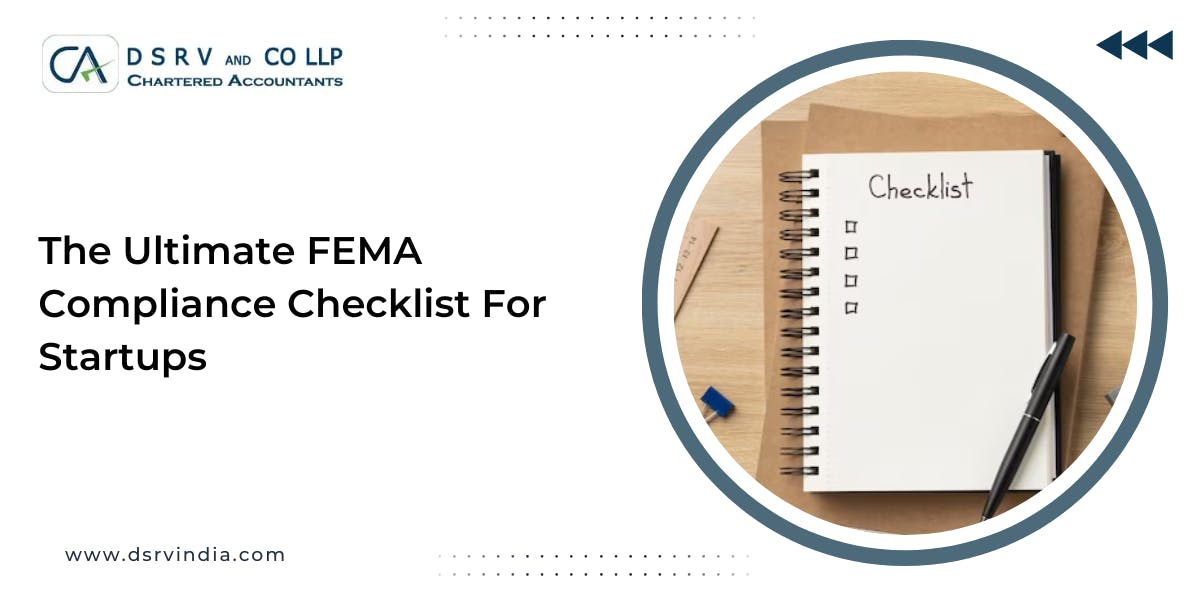FEMA compliance is a crucial aspect of running a business in India. The Foreign Exchange Management Act (FEMA) was enacted in 1999 and regulates all transactions involving foreign exchange in India. FEMA compliance is enforced by the Reserve Bank of India (RBI) and aims to facilitate external trade and payments, promote orderly development and maintenance of the foreign exchange market in India, and conserve the country’s foreign exchange reserves. To ensure that they meet all the requirements of FEMA, startups can seek the help of a tax consultant in gurgaon.
For startups, ensuring compliance with FEMA Compliance Checklist for startups is critical. Non-compliance with FEMA can lead to hefty penalties and legal consequences. Startups should consider working with an expert to ensure that they are fulfilling all fema compliance requirements.
A chartered accountant firm in india can assist startups in understanding the complex regulations of FEMA and ensure that they are fulfilling all the necessary requirements. They can provide guidance on maintaining foreign currency accounts, adhering to the limits for foreign investments, designating an Authorized Dealer for foreign exchange transactions, and many more.
In this article, you will explore what is fema compliance and FEMA compliance requirements for startups and explain why it is important to fulfill FEMA requirements.
What Is FEMA Compliance?
FEMA compliance refers to adhering to the Foreign Exchange Management Act (FEMA) rules and regulations while conducting transactions involving foreign exchange. It is mandatory for all businesses in India, including startups, to comply with FEMA Compliance Checklist for startups.
FEMA compliance covers a wide range of activities, including receiving and paying foreign currency, acquiring and transferring immovable property outside India, opening and maintaining foreign currency accounts, and investing in foreign companies, among others.
In India, Foreign Direct Investment (FDI) is possible through two routes: automatic and government routes. The automatic route allows startup companies to invest in certain sectors without prior permission from the government, whereas the government route requires approval from relevant ministries or government-led authorities through the Foreign Investment Facilitation (FIFB) portal.
Sectors Under Automatic Route:
Under the automatic route, foreign direct investment includes sectors such as agriculture, healthcare, e-commerce, financial operations, manufacturing industry, foreign trade investment department, capital gains, and mining. However, there are specific sectoral thresholds and prohibited sectors that investors need to comply with before making investments. For instance, fdi in india in the lottery business, Nidhi, construction companies, real estate trade, nuclear energy, and casinos are not allowed under the automatic route.
Sectors Under Government Route:
FDI in certain sectors requires approval from the relevant ministries or government-led authorities through the FIFB portal. Some sectors that come under the government route include banks and the public sector (20%), multi-brand retail (15%), core investment companies (100%), and retail food (100%).
FEMA Compliance Checklist For Startups:
Startups must comply with the Foreign Exchange Management Act (FEMA) guidelines before participating in FDI. Here are some of the key FEMA Compliance Checklist for startups:
Eligibility Criteria: Investigate the eligibility of individuals seeking to raise funds through foreign direct investment.
Sector Threshold: Check whether the total foreign investment in India/FDI meets the sector threshold and is not less than the prohibited sector.
Sector Limits: Ensure that FDI does not exceed sector limits due to the issuance of bonuses/rights.
Share Issuance: Determine whether the company is required to issue shares to cover pre-operational/pre-incorporation costs if any.
Calculation of Total Foreign Investment: Determine whether the instructions are met while calculating the total overseas direct investment.
Annual Return: Decide whether to file an annual return of foreign liabilities and assets by July 15 each year. The report must be submitted even if there is no new grant in a given year.
FEMA Compliance Checklist for Government Approval Path:
If startups are seeking FDI through the government approval path, they must adhere to the following FEMA Compliance Checklist for startups:
Stock Transactions: Determine if there are any types of international markets stock transactions from residents to non-residents seeking state certification.
FIFB Approval: Determine whether FIFB prior approval is available for FDI across sector boundaries.
FEMA Compliance Checklist for Setting up a Branch/Project Office/Liaison in India
If startups are setting up a branch/project office/liaison in India, they must adhere to the following fema inspection checklist:
Compliance with Companies Act 2013: Specify whether a foreign company in india carries on a business deemed to have a place of business in India under the Companies Act 2013 and whether compliance with CA 2013 and FEMA has been duly complied with.
Prior Approval: For international markets stock market investments, make sure to get prior approval from the government. Power of attorney for investment through the exchange of shares Alternative foreign investment fund (AIFs)/SEBI-registered domestic venture capital funds investing in equity and equity-based products of overseas venture capital firms limited to USD 500 million.
Obligations: Determine whether obligations such as annual performance reports, Indian lot transfer reports, etc., have been properly met.
Other important features for FEMA compliance
FEMA does not apply to Indian citizens residing abroad. There is a standard method for determining the domicile of Indian citizens. In such methods, the number of days a person spends in India is counted against a base standard of 182 days or more. The office, branch, or agency may be considered a person while using these technologies.
FEMA gives the federal government the right to impose restrictions on three items and the right to control them. These include payments from India, payments to a resident outside India, and foreign security schemes.
Importance of Fulfilling FEMA Requirements for Startups:
Startups need to comply with foreign exchange management regulations for several reasons, as shown below:
Avoid Legal Consequences and Penalties:
Non-compliance with foreign exchange market regulations can lead to legal consequences and hefty penalties. Startups can face fines ranging from INR 5,000 to INR 2 crore for violations under FEMA regulations. In some cases, non-compliance can also lead to imprisonment.
Facilitate Foreign Investments:
Startups often require to invest in companies to grow their business. Compliance with FEMA regulations can make it easier for startups to attract foreign investments and expand their operations globally.
Easy and Fast Transactions:
Compliance with fema audit requirements can facilitate easy and fast transactions involving foreign exchange. It can help startups avoid delays and other issues arising from non-compliance.
Enhance Business Reputation:
Compliance with FEMA regulations while going through startup funding stages can enhance a startup’s reputation in the business world. It demonstrates the startup’s commitment to ethical and legal business practices, which can help attract customers, investors, and partners.
In conclusion, startups must adhere to FEMA regulations when raising funds through foreign direct investment in india. It is essential to ensure compliance with the guidelines provided by the government and the Reserve Bank of India. The fema inspection checklist for startups and incumbents includes various parameters that need to be followed while raising funds through foreign direct investment. By following these guidelines, startups can prevent legal complications and ensure a smooth process of raising foreign investment. It is crucial for startups to conduct proper research and obtain professional assistance to ensure compliance with FEMA regulations.






